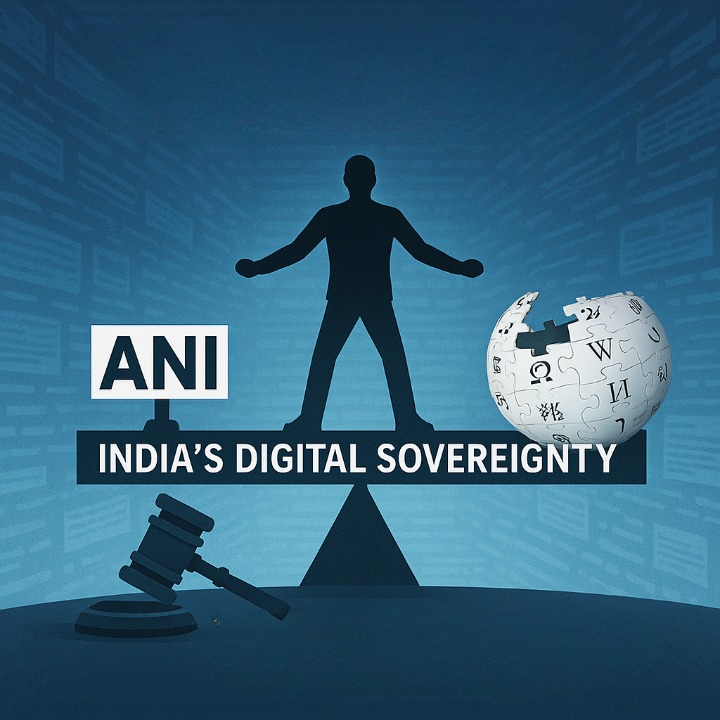
- The Supreme Court had to contend that an order for content junking must specify the alleged lies or dangerous allegations in the content.
- ANI contended that Wikipedia had allowed anonymous edits to call it a ‘propaganda tool’ for the Indian government, thereby lowering its credibility.
- India seeks to bring world platforms to the bar of original laws under the Information Technology Act, 2000, and the soon-to-be legislated Digital Personal Data Protection Act, 2023.
- The Supreme Court’s May 9, 2025, judgment, emphasising precise content regulation, could impact how free speech and responsibility are balanced worldwide.
Introduction
On 9th May 2025, the Supreme Court of India, during the ongoing vilification case between Asian News International (ANI) and the Wikimedia Foundation in the Delhi High Court, the Supreme Court had to contend that an order for content junking must specify the alleged lies or dangerous allegations in the content. The Supreme Court decision, restraining unlawful directions issued more in a manner of balancing between the protection of character and freedom of expression, therefore assured this delicate balance in the vilification law.
The Supreme Court’s decision highlights India’s attempt to regulate similar transnational technology platforms, keep them responsible and sculpt out an identity for itself in the digital sphere; this asserts that the vilification issue at hand is beyond the character of a single news agency. At a time when narratives greatly affect the way people view countries and societies, this matter stands as a case in point for a transnational battle over information operations.
Core of the conflict
ANI contended that Wikipedia had allowed anonymous edits to call it a “ propaganda tool ” for the Indian government, thereby lowering its credibility. On the same day, the Delhi High Court issued notice to Wikipedia on an operation filed by ANI seeking the junking of the scandalous content. This move followed the Supreme Court judgment that had been disapproved before the High Court orders on the grounds of lack of particularity. The Supreme Court ordered that any content-junking orders to specifically identify the false or dangerous material, divorce from generalised instructions. Further, it clarified that courts shouldn’t order editorial content on a particular media platform, as it rescinded an order for the junking of a Wikipedia runner concerning the suit itself. The contestation started in July 2024 with the High Court ordering Wikipedia to expose the identities of three editors who had made changes to ANI’s runner. Wikipedia in turn notified the druggies in private but upheld their policy of protection. The matter further escalated from then. ANI’s wider enterprises about Wikipedia’s alleged bias detector, a debate about Wikipedia’s equity and legal responsibility in India.
India’s Digital Sovereignty Push
This stage-alone case is foundational to India’s lesser bid of claiming authority over its digital narrative. As a prospective world power, India is well within its rights to seek oversight and control over external tech platforms that handle information and data related to the country, especially when such platforms, like Wikipedia, operate within its digital and informational sphere. The government in November 2024 probed Wikipedia’s status as a mediator and impulses, flagging a stricter governance of alerts. India seeks to bring world platforms to the bar of original laws under the Information Technology Act, 2000, and the soon-to-be legislated Digital Personal Data Protection Act, 2023.
Legal and Ethical Dimensions
This case is one between the right to free speech and character. ANI’s counsel, Sidhant Kumar, submitted that by virtue of being a conciliator, Wikipedia ought to comply with India’s IT Rules, 2021, by taking down contended scandalous content without debate. Wikipedia’s counsel, Akhil Sibal, defended the editing process, but the court took the position against Wikipedia on April 8, 2025, holding that it had erred from its commitment to impartiality. The Supreme Court’s judgment of May 9, 2025, further questioned what a correct junking of content must look like to cover both free expression and reputational rights.
India’s Path Forward
This case is a wake-up call for India to bolster its digital game. First, it needs to gourmandise-track the Digital Personal Data Protection Act, 2023 to strain rules on platforms like Wikipedia. Second, erecting homegrown druthers, suppose China’s Baidu could cut reliance on foreign tech. Third, tutoring people to spot prejudiced narratives can empower citizens to challenge disposed information. The case aligns with India’s artistic principles of justice and verity. India is defending not only ANI but also its freedom to define its transnational image by querying Wikipedia. The coming hail, listed for July 7, 2025, may change the way countries govern tech companies.
Global Implication
The ANI- Wikipedia disagreement is an exemplification of the fight for verity in the digital age. India’s demand for responsibility challenges the unbounded power of global platforms. The Supreme Court’s May 9, 2025, judgment, emphasising precise content regulation, could impact how free speech and responsibility are balanced worldwide. For India, embedded in ancient principles yet embracing futurism, this case is a bold step toward shaping its digital future.
Megna Devkar is a Ph.D. Research Scholar at K.C. Law College with research and writing expertise in social, political, and legal issues. Views expressed are the author’s own.
